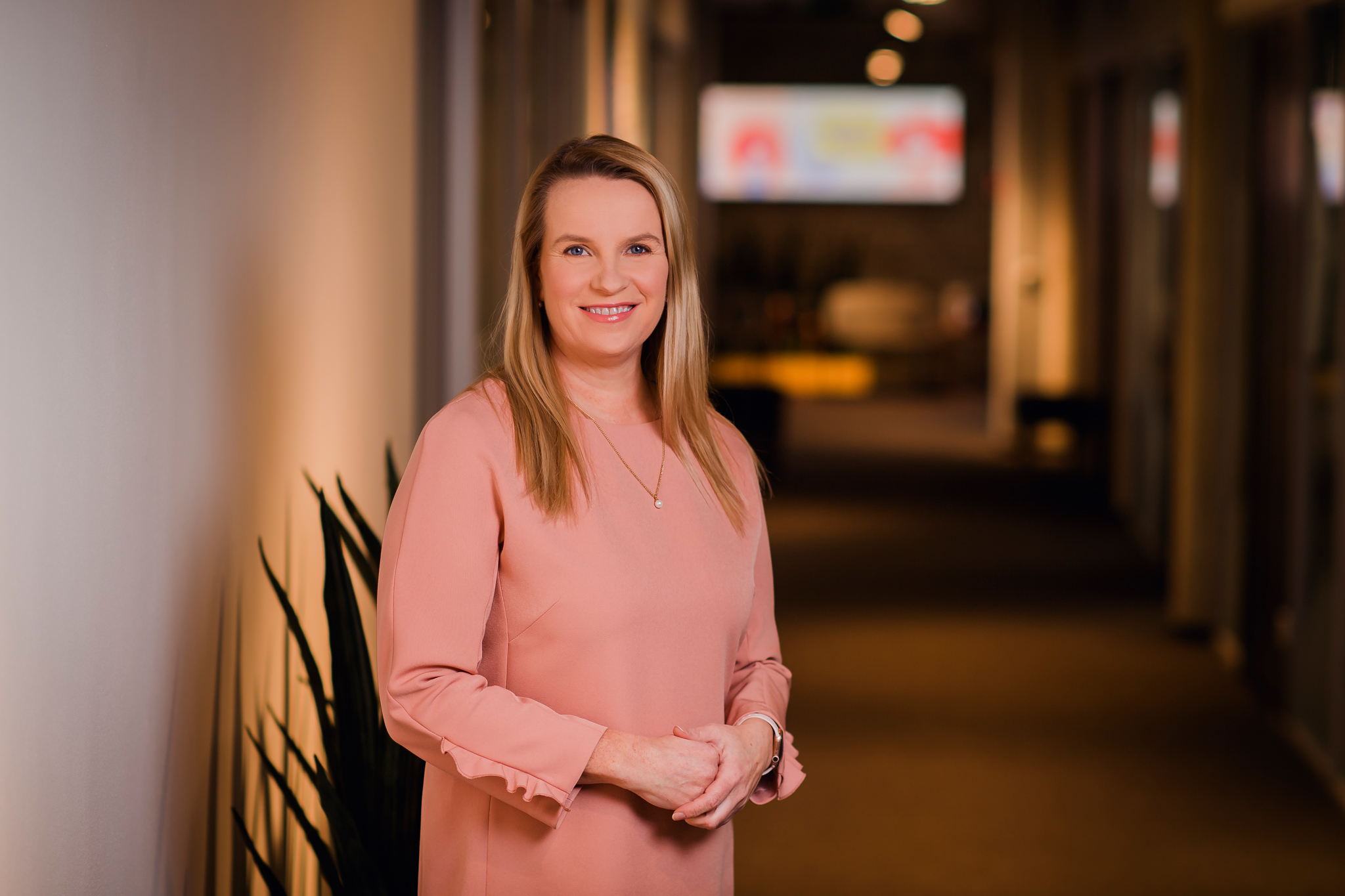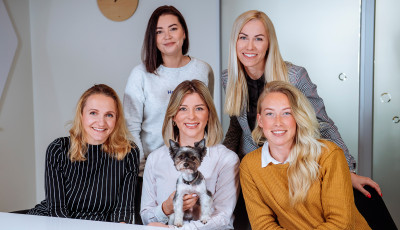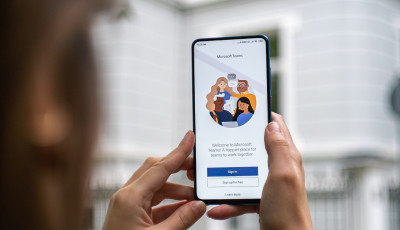Signe Lass, the group’s talent manager, will introduce what Helmes’ principles are when it comes to keeping and managing people, and what the recognition by the European Parliament actually means for us.
Having been awarded the title of Dream Employer in the Private Sector, Helmes has now been recognized alongside Siemens, Renault, SEB, and Miele as one of the ten most outstanding people management case studies by the European Parliament. What’s the secret of your success?
I’d say it’s how much we care and how much we’re trusted. We want to be the best partner we can possibly be to our clients and staff. We’ve been people-first in our approach for the last 15 years. It’s part of our DNA now. It’s in everything we do. That means we offer a working space in which everyone’s valued and has the chance to realize their full potential. In business terms, we’re incredibly ambitious and offer our clients premium-class services. We can only do that by being very picky about who we choose and then giving them free rein, while at the same time looking out for their well-being and development so they can make a success of themselves and grow at the same pace as the company and their clients.
On top of that, we focus on creating value for clients and making sure we don’t get distracted. We only have three yardsticks in Helmes: job satisfaction, customer satisfaction, and profit. Our development teams have their own clients and projects, and they’re financially independent. They operate like small companies, creating systems, dealing with clients round the clock, sharing their success stories with each other and sorting out problems. They get to decide for themselves what they do and how they do it. The same is true of our support functions: our focus is on serving our “internal clients” in the best way we can.
And then there’s the fact that we’re so thorough but also so personal in our approach to things. We don’t enforce certain frameworks on our staff. We don’t “manufacture” rules and guidelines. We dig down into issues and accept a variety of solutions.
That model has proven itself to us over time, and people notice it.
You earned the recognition of the European Parliament for a hybrid work project you undertook. How did you come to pilot it? What conclusions have you drawn from it?
Because of the pandemic, we got around to piloting the project in the spring 2020. Overall, remote work’s pretty easy to implement in IT, but we quickly realized that everyone working from home all the time brings with it a whole host of changes that go well beyond the organizational side of things. We needed to work out what our new working environment should be like if we wanted to carry on operating as successfully as we were. Staff well-being is a business-critical factor in services. It has a huge effect on service quality and business performance.
The pilot project lasted for six months and involved 100 people from Helmes. We brought in an expert from outside the company who helped us design a model for the conducting of the survey that was based on our needs and science. The piloting teams tested a range of hybrid work models, while the control teams worked as normal without any external observation. The piloting teams measured well-being, how well the team was working, and team dynamics at regular intervals, and we held discussions with them as individual teams and across teams. We advised their managers and analyzed the data we gathered from the questionnaires and the discussions. Two factors stood out most clearly – a psychological sense of security and a clarity of objectives – in which we saw a marked improvement in the piloting teams.
With the knowledge we gained from the piloting project, we put some key principles and recommendations in place for use in our day-to-day work, like the planning of work based on people’s personalities – individual work, teamwork and social interaction, an individual approach that takes both the employee’s and the team’s needs into account, hybrid work agreements and retros within a team, and fostering well-being as a skill.
But the work’s ongoing. Stage 2, which is where we’re at now, is about our new office space concept. Sure, activity-based working isn’t a brand-new concept by any means. Still, the pilot project showed us that people’s expectations of their office are highly individual and that the office’s role is completely changing. The Helmes office of the future will be a social hub.
You earned the recognition of the European Parliament for a hybrid work project you undertook. How did you come to pilot it? What conclusions have you drawn from it?
Because of the pandemic, we got around to piloting the project in the spring 2020. Overall, remote work’s pretty easy to implement in IT, but we quickly realized that everyone working from home all the time brings with it a whole host of changes that go well beyond the organizational side of things. We needed to work out what our new working environment should be like if we wanted to carry on operating as successfully as we were. Staff well-being is a business-critical factor in services. It has a huge effect on service quality and business performance.
The pilot project lasted for six months and involved 100 people from Helmes. We brought in an expert from outside the company who helped us design a model for the conducting of the survey that was based on our needs and science. The piloting teams tested a range of hybrid work models, while the control teams worked as normal without any external observation. The piloting teams measured well-being, how well the team was working, and team dynamics at regular intervals, and we held discussions with them as individual teams and across teams. We advised their managers and analyzed the data we gathered from the questionnaires and the discussions. Two factors stood out most clearly – a psychological sense of security and a clarity of objectives – in which we saw a marked improvement in the piloting teams.
With the knowledge we gained from the piloting project, we put some key principles and recommendations in place for use in our day-to-day work, like the planning of work based on people’s personalities – individual work, teamwork and social interaction, an individual approach that takes both the employee’s and the team’s needs into account, hybrid work agreements and retros within a team, and fostering well-being as a skill.
But the work’s ongoing. Stage 2, which is where we’re at now, is about our new office space concept. Sure, activity-based working isn’t a brand-new concept by any means. Still, the pilot project showed us that people’s expectations of their office are highly individual and that the office’s role is completely changing. The Helmes office of the future will be a social hub.
As you’ve said, “people-first” and focusing on mental health have been your approach to things for about 15 years. What are the biggest lessons you’ve learned on those fronts?
That if you fail to notice things or to respond to situations and the moment passes, things can be really hard for the people affected, at work and at home, including for their families.
We’ve learned in focusing on these issues that the way you deal with well-being and mental health must be systematic and consistent. These days we’re placing more and more emphasis on prevention and fostering our well-being and mental health skills – how each of us individually can help others, and how colleagues can support one another.
It’s a whole set of competencies, true, but it’s something most of us are capable of. We’re just not used to considering it important as a skill. It’s about healthy working, exercising and sleeping routines, good relationships at work and in your personal life, keeping your emotions in check, problem-solving skills, changing the way you think, and adopting new habits. It’s heartening to see that as time goes by, more professionals and experts are offering these sorts of services.
Unfortunately, the world around us and the crises we’re facing are only making matters worse. In that sense, it’s a bit of a race against time. But small things can be a big help: paying attention to people and really listening to them, giving feedback and recognizing good work, noticing the positives in things and letting others know about them, actual contact with people, talking to them, enjoying stuff together.
We encourage staff to hold meetings outdoors in the fresh air, including walking meetings. We provide ergonomic workspaces both in the office and for people working from home, and we remind everyone how important it is to take breaks. We also bring more fun into the office, getting together for events and things. Working remotely in other countries is really popular as well, combining work and travel. If people have problems, we advise them individually, bringing experts in from outside the company wherever needed. We consider it entirely normal for people to have periods when they need to take longer breaks or reduce their workload.
October is Mental Health Month in Helmes as it is elsewhere, and one of the new things we’re offering this year is individual consultations with a mental health coach. There’s been a huge interest in it, so we’re planning to add it as a permanent feature to the annual medicals we offer. Alongside talks, we’re putting more and more emphasis on inclusive activities, themed workshops, practice, and exercise.
Helmes has offices in a number of countries. Is it hard running them all from here in Estonia? What difficulties do different countries throw up?
Our guiding principle is that all of our development centers need first-rate HR heads who champion Helmes’ culture and foster a working environment that brings out the best in people.
It’s not a complicated task to develop a group-wide strategy and concepts. In fact, it keeps you more focused. What’s difficult is implementing things so that their positive impact reaches everyone. The situations in different centers and their needs can vary greatly. We have opened new offices in Georgia and Poland and welcomed a new company from Lithuania. The situation’s different everywhere, and there’s always a local focus in addition to whatever you’re doing centrally.
We focus on two strategic areas – the learning environment and development and recruiting talent. Our HR team work closely together across the group on both of these areas, sharing their experience and learning from each other. Earlier this year, we adopted a new global recruitment model since finding the talent we need in our sector is one of the hardest things we’re faced with. We now have our own international recruitment community, centralized management for recruiting between countries, and centralized development of recruitment and employer branding competencies.
We also have a brand new concept for shaping a fully integrated learning environment. We want to help people realize that development doesn’t only occur within their specific role or team but that there are many other possibilities and dimensions to it.
Many tech companies in Estonia and other countries have been announcing redundancies of late. How do you ensure stability in Helmes?
We have a big, very diverse portfolio of clients operating in different markets and fields, many of whom we’ve worked with for a long time. That allows us to hedge our risks. Obviously, we keep an eye on the situation, but at the moment, we’re seeing good opportunities for growth. The need for technological innovation and quality software development is continuing to grow worldwide. That’s what we’re good at, which is why we’re moving into new job markets and opening new development centers.
I’m not surprised there are redundancies in the tech sector. You only have to look at the number of companies offering HR management software products to see how oversaturated it’s become. There aren’t enough hours in the day to turn down all their offers, and it’s quite entertaining watching them tie themselves in knots with their marketing.
It’s become popular in start-ups and the technology sector to offer company options to staff. Has Helmes jumped on that bandwagon?
We’ve had an options program for our staff since 2017. Ours is different, though, because we offer it to key workers – we recognize those who make the biggest contribution to the company’s development and the group. We want the leading talent in our field to throw their lot in with us for the long haul and get the reward they deserve for their contribution. Currently, around 25 percent of our staff are involved in our options program, and we share about 12 percent of the company’s shares with them.
What should people know about the head of HR in an international company? What’s the biggest surprise or aspect of your work that people wouldn’t normally associate with it?
I think management roles are pretty universal, but I personally really like the international context of it. It broadens your horizons and the way you think and go about things.
As for what’s special about how we operate, I guess I’d highlight the importance of building relationships and the time you need to invest in that, as you would any other important relationship in life. That applies not just in regard to your own team but without exception to the heads of all business units and support functions. You need to have regular meetings to hear things, discuss them and come to understand them in the same way to achieve results. HR is the one thing that links all areas in a company.
Another aspect is tech diversity. HR services today are very tech-savvy, but there are still things you should only ever entrust to people.You have to have a good systems architect to put together your environment, with the right components and resources in the place you need them to be, doing what you need them to do. That system is one that supports and inspires people, and that does what the company needs it to. As jobs go, it’s pretty interesting and requires quite a “custom-made” approach.



